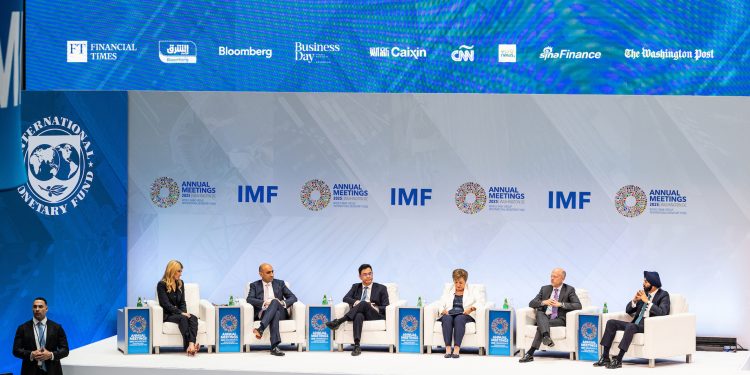- Digital or Die: IMF Chief Warns Nations as the Future of Money Goes Online
“Accept reality: fiat money is moving digital.” With those words, International Monetary Fund Managing Director Kristalina Georgieva delivered one of the starkest messages yet to governments reluctant to embrace financial innovation. Speaking at “The Future of Finance” panel during the IMF-World Bank Annual Meetings in Washington, she called on policymakers to prepare for a world where physical cash may no longer define sovereignty.
“Do not close your eyes to reality,” she urged. “Countries need to understand what is at stake and decide their best course of action.”
Moderated by CNBC’s Sarah Eisen, the high-profile session assembled an eclectic mix of global regulators, bankers, and digital pioneers to discuss the next chapter of finance, from central bank digital currencies (CBDCs) to stablecoins and tokenised money. What emerged was a consensus that the financial world is racing toward a digital-hybrid future, and those who fail to design interoperable systems risk being left behind.
Representing the private-sector frontier, Jeremy Allaire, co-founder and CEO of Circle, the issuer of the USDC stablecoin, described his vision of “ultra-safe, fully reserved money that could move at no cost with incredible velocity and speed.”
Allaire argued that a future monetary system should mimic the openness of the internet, borderless, efficient, and trust-based, but warned that “regulation must move as fast as innovation.”
That optimism was tempered by concerns about fragmentation. Chia Der Jiun, Managing Director of the Monetary Authority of Singapore, cautioned that interoperability must be designed “from the start with the same consistent principles and standards.” Without that, he warned, the world could splinter into competing financial networks, each incompatible with the other.
World Bank Group President Ajay Banga struck a pragmatic note, focusing on how digital money could advance financial inclusion.
Digital assets, he said, can reduce cross-border payment costs and help small businesses integrate into the global economy. But technology alone is not a silver bullet.
“You still need an on-ramp and an off-ramp into the banking system,” Banga said. “Real inclusion comes with credit histories and insurance histories.”
His caution reflects a growing debate across emerging markets, including Ghana, where mobile-money platforms like MTN MoMo have driven financial access but also raised new regulatory questions. African economies, where digital wallets already dominate small-scale commerce, are seen as testing grounds for how digital fiat systems could work in practice.
The IMF and World Bank are increasingly studying such models, with Ghana’s Bank of Ghana piloting its e-Cedi, and Nigeria’s e-Naira project under review. Both highlight Africa’s dual reality, being at the cutting edge of fintech adoption yet facing risks from currency volatility and weak consumer protection frameworks.
From the banking industry, Umar Farooq, co-Head of Global Payments at J.P. Morgan, said the market is already proving that innovation and incumbency can coexist.
“Stablecoins, commercial bank money, central bank money, all these things will coexist,” he noted. “Payment’s innovation doesn’t eliminate what came before; it builds layers of choice and resilience.”
His remarks underscored the emerging consensus that the future of finance will not be defined by a single technology but by connectivity and trust among multiple systems, public and private, regulated and open-source.
For Georgieva, the challenge ahead is finding the equilibrium between innovation and predictability.
“There has to be agility,” she said, “but there also has to be a sense that you can anchor your economic behaviour into some predictability.”
That balance may well define the decade ahead. As IMF officials repeatedly emphasise, digital transformation must not come at the cost of financial stability. The Fund’s new Digital Money Strategy, to be rolled out next year, will guide members on regulatory coordination, cybersecurity, and cross-border interoperability.
For Ghana and its peers, the debate is far from theoretical. The Bank of Ghana’s digital currency pilot, one of the most advanced in Africa, seeks to reduce transaction costs and formalise the informal sector. Yet as the IMF’s warning suggests, moving too slowly risks exclusion from the emerging global financial grid.
With remittances, trade payments, and public-sector transfers increasingly shifting to digital rails, the region’s policymakers must confront Georgieva’s reality check: money’s digital migration is no longer optional.








